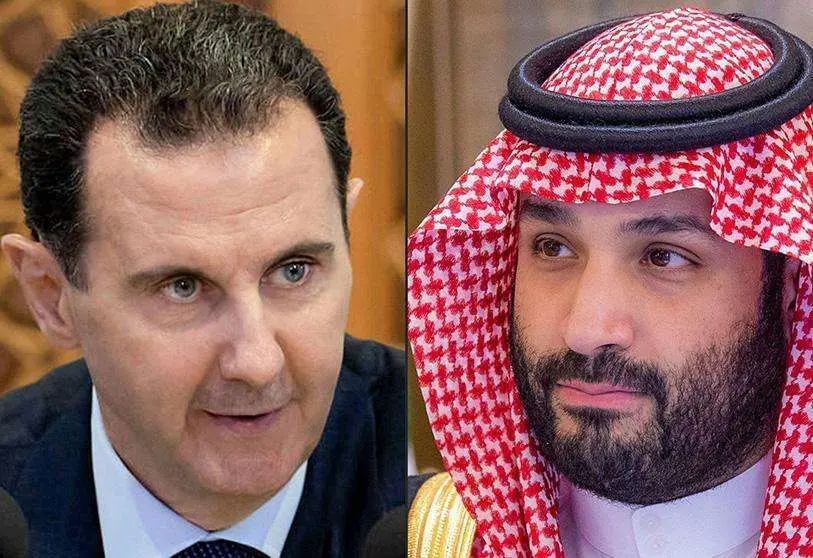Saudi Arabia leads rapprochement between the Arab world and Syria

In recent weeks, the political map of the Middle East has undergone important changes that will undoubtedly have key consequences for the region. Just over a month ago, and with China as mediator, Saudi Arabia and Iran announced the reestablishment of their relations, suspended by Riyadh in 2016 after the attack on its embassy in Tehran. The rapprochement between the two countries has generated hopes for peace in Yemen, a nation that could soon achieve the long-awaited peace after eight years of war.
Saudi Arabia is also a key player in the other major current political development in the Middle East: the Arab world's rapprochement with Syria. Damascus was expelled from the Arab League in November 2011, months after the start of the bloody conflict that continues today. In addition to the expulsion, Arab states imposed sanctions against the government of Bashar al-Assad and many of them began to support Syrian opposition groups.

In recent years, however, countries such as Iraq and Egypt have given their blessing to Syria's possible return to the pan-Arab organisation. In this regard, the United Arab Emirates decided in 2018 to reopen its embassy in Damascus, thawing diplomatic ties with al-Assad's government. However, despite the desire of several League members, the organisation has continued to meet over the years without agreeing to Syria's return.
This could change. February's devastating earthquake marked a turning point in relations between Syria and the rest of the Arab world. In the aftermath of the quake, the region reached out to northwest Syria, sending rescue teams, humanitarian and medical aid. The Saudi Kingdom, for example, sent 16 planes with more than 85 tonnes of aid, including 1,000 tents, 13,329 items of clothing, 3,600 blankets and 3,600 mattresses, according to figures reported by Arab News.

The days following the earthquake were marked by several visits to Damascus by high-ranking Arab officials, including the foreign ministers of Jordan and the United Arab Emirates, which, according to al-Assad himself, was "one of the first to provide aid to Syria". The Syrian president also had his first phone call with his Egyptian counterpart, Abdel Fattah Al-Sisi, and travelled to Oman on an official visit after the earthquake. Another symbolic scene of this rapprochement was the arrival of the first Saudi aircraft on Syrian soil in more than a decade.

After several years of deepening relations with Iran and Russia, Damascus is once again looking to its Arab neighbours. In particular, Syria has already laid the groundwork for renewed ties with Saudi Arabia during a meeting in Riyadh between its Foreign Minister Faisal Mekdad and the head of Saudi diplomacy, Prince Faisal bin Farhan. For the first time since the Syrian civil war began, the Gulf kingdom has hosted a Syrian Foreign Minister.
#SaudiArabia's Foreign Minister Prince @FaisalbinFarhan and his Syrian counterpart Dr. Faisal Mekdad hold a session of official talks in #Jeddah pic.twitter.com/yqdNDPluZ4
— Saudi Gazette (@Saudi_Gazette) April 12, 2023
During the meeting, Mekdad and Bin Farhan agreed to initiate procedures to resume consular services and flights between the two countries, as well as to cooperate in the fight against drug trafficking and terrorism. They also pledged to seek a political solution to the Syrian crisis, according to a joint communiqué issued after the meeting.
The meeting, in which the two diplomats referred to Syria's "unity, security, stability and territorial integrity", comes just days before a meeting of Arab Foreign Ministers in Riyadh, where the return of Damascus to the Arab League will be discussed, according to sources quoted by the Financial Times.
#Jeddah | Foreign Minister HH Prince @FaisalbinFarhan receives Syria’s Foreign Minister, H.E. Dr. Faisal Mekdad. ???? pic.twitter.com/MIR8dmKmld
— Foreign Ministry ?? (@KSAmofaEN) April 12, 2023
Last February, Bin Farhan spoke positively about Syria's return to the alliance. According to the Saudi Foreign Minister, there was 'a growing consensus' in the Arab world that isolating al-Assad was not working.
North African voices have also been heard in favour of rapprochement with Syria. Tunisia, for example, has announced that Syria will reopen its embassy in the Maghreb country, after Tunisian President Kais Saied ordered the foreign ministry to appoint a new ambassador to Damascus.
However, Syria's return to the organisation is still unclear. According to The Wall Street Journal, at least five members - including Qatar and Kuwait - refuse to readmit Damascus. Even Egypt, a strong ally of Saudi Arabia and one of the countries that has maintained contact with al-Assad, is reportedly opposed, according to the US newspaper.








